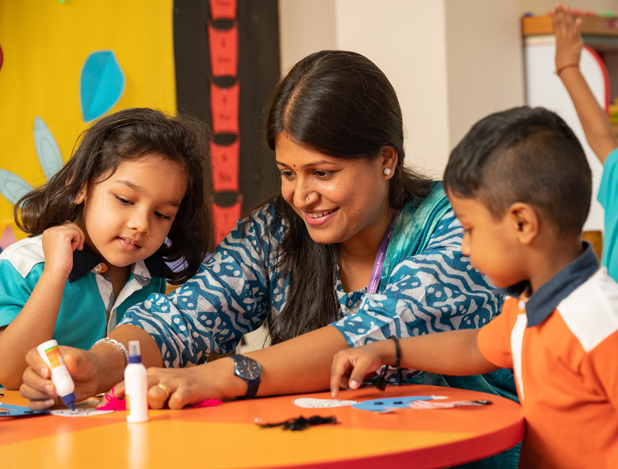Here Is Why Parents’ Should Never Skip Their Child’s Early Years Of Education
- 19 September 2022


Early childhood education for our young children was something that wasn’t addressed or even discussed a few decades ago. Children were mainly confined to their homes till up to 5 years of age. With the turn of the century, even the early years’ education has taken a turn in India. A lot of emphasis is being laid on the concept of early childhood education and learning.
The New Education Policy (2020) highlights, “Over 85% of a child’s cumulative brain development occurs prior to the age of 6, indicating the critical importance of appropriate care and stimulation of the brain in the early years in order to ensure healthy brain development and growth.” Hence, the early years of these tiny tots are very crucial for their own later health and development.
Early years education in simple terms is the care and education of children right from birth to eight years. This time period of the child is segregated into three phases of learning, which include:
While the first phase of learning, i.e., early stimulation, happens at home, the rest of the education of the child must happen in school where the development of socio-emotional skills, motor skills, cognitive skills and language skills takes place.
UNESCO emphasises that “Early Childhood Care and Education (ECCE) is more than preparation for primary school. It aims at the holistic development of a child’s social, emotional, cognitive and physical needs in order to build a solid and broad foundation for lifelong learning and wellbeing. ECCE has the possibility to nurture caring, capable and responsible future citizens.”
The whole world understood the importance of early education, to an extent that it is included in the Sustainable Development Goals (SDGs). The SDG is to provide all children with quality early childhood development, care and pre-primary education by 2030.
Hence, parents should be aware that failing to provide a high-quality early childhood education limits their children’s futures by denying them the chance to realise their full potential.
According to the Milwaukee study report, children who enrolled in these early years education programs are more well-behaved. They have higher IQ scores than their peers without formal education.
Even the New Education Policy (2020) indicates that India is currently in a learning crisis. A large proportion of children currently in elementary school – estimated to be over 5 crores in number – have not attained foundational literacy and numeracy.
For many children, preschool is their first experience in a structured setting with groups of children and teachers. It’s an opportunity for them to learn, share, follow instructions, and begin the foundation for learning.
At preschool, the staff and teachers are well trained. They understand how children of these ages develop and learn. Hence teachers organize space, time and activities based on their age to promote the development of social, cognitive, emotional, and physical abilities of the pre-schoolers.
Early years education improves social learning and helps the child to develop a sense of self in their social settings. This is important as this is the first time the child gets a chance to sense an identity separate from their parents.
Some parents decide to not enroll their children and give them everything a preschool can give, at home. This may be possible but entails complete commitment and a lot of hard work. There certainly are a lot of advantages for your child if he/she starts their early years of education with a preschool.
For instance, Oakridge International School is one of the few schools in India that offers the Cambridge Early Years Program. Its primary focus is on earth science, visual arts, technology, life skills, music perception, and value education, as they are the best ways to stimulate the brain development of a child. The uniquely designed curriculum delivers exclusive first-hand learning where children partake in activities and learn, instead of merely reading about them.
Before deciding to forego your child’s preschool education, you should weigh these pros and cons and decide accordingly.

Hyderabad, Gachibowli

Hyderabad, Bachupally

Visakhapatnam

Mohali
Bengaluru